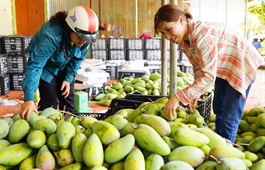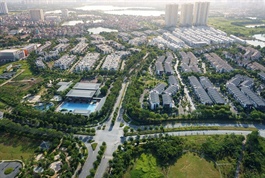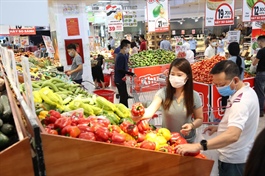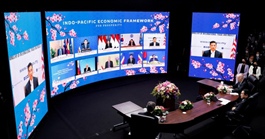Vietnamese enterprises stay firm in face of economic turmoil in Russia
Vietnamese enterprises stay firm in face of economic turmoil in Russia
While a series of sanctions caused the Russian market to wobble at times, Vietnamese textile and garment enterprises have stood firm and continued to earn profits.

All sewing lines are operating steadily, and employees are working enthusiastically at the garment factory of Phan Manh Hung’s Ruviteks company in Moscow Province.
Hung told Vietnam News Agency: “Before the COVID-19 pandemic, my garment factory had more than 100 workers, but now there are about 40 workers. However, production activities are still stable, and workers' income is guaranteed.”
Ruviteks maintains a close relationship between factory owners and employees, a key factor in helping the business.
The leader added the company continuously contributed to charity, from making masks to provide to the Russian people during the outbreak of the COVID-19 pandemic in early 2020 to building a house of gratitude in Ben Tre in Viet Nam to support children and helping people in the Donbas region to evacuate to Russia.
He said: “We can do those things because workers are willing to spend a few working days to sew products for charity with materials donated by the company.”
Nguyen My Binh, who has worked at Ruviteks since 2017, said: "My husband and I work here together. We send home from US$800 to more than $1,000 each. My boss guarantees there are always orders to do and no shortage. So all we need is to work hard.”
Nguyen Van Thiet, from Bac Giang Province, has also worked with his wife at Ruviteks since 2017. Thiet said: "When I went here unskilled, everyone helped me to learn how to do the job. After only one month, I got the salary of the skilled workers. During COVID-19, work was difficult, but the boss helped the workers to stay stable."
Hung said the secret for enterprises to overcome recent difficulties was stabilising production, attaching workers' interests to the enterprise, and providing stable goods to the market. Due to the steady number of customers and product output, Ruviteks was proactive in purchasing raw materials.
Though raw materials for the garment industry in Russia were mostly imported and greatly affected by the current situation, by actively building a 1-year or 18-month production plan before the conflict broke out, the Hung garment factory had stabilised the source of input materials for a long time.
As the garment industry depended on workers, businesses always needed to ensure a minimum income for employees to keep the workers. His company's minimum income was about VND15 million or $700 excluding all expenses, said Hung, adding he always supported employees, especially from 2014 to May 2020, so they could "work with peace of mind."
Since 2014, the company has completely waived the fee for the extension of household registration from the 2nd year onwards for employees. Thanks to the close and trusting relationship between business owners and employees, Hung said when conflict broke out, the Russian ruble depreciated sharply, directly affecting people, labour and businesses in 2022, his employees agreed to have their salaries cancelled until the crisis passed.
Fortunately, the exchange between the US dollar and the ruble was okay, and Hung could transfer the salary.
Also in Moscow Province, at the Sarlanter garment factory of Do Van Tieu there are about 50 workers with a stable income.
Phung Duc Long, who has worked at Sarlanter for nine years, said: “The income here is quite steady. "The salary is about US$1,600 for two months. The company pays the salary every two months and will send it back to Viet Nam. Everyone here lives in solidarity. We treat each other like brothers and sisters in a family."
Owner of the Sarlenter garment company Do Van Tieu revealed that his business had learned from other countries. For example, in Japan "people treat workers in such a way that the factory can be considered home."
Tieu said: “That is why they stick with me.”
He said that long-time workers who did not violate discipline would receive an additional $30 monthly bonus.
Tieu's company regularly organises sports and arts activities for employees to enjoy a joyful atmosphere.
Amid the ups and downs in the market in Russia, a close relationship between employers and employees helped Vietnamese garment factories in a hard time.
























